Mary Anne Yarde's Blog: The Coffee Pot Book Club , page 134
June 16, 2019
Check out Simon Turney's fabulous new book — Commodus (The Damned Emperors) #NewRelease #HistoricalFiction @SJATurney

Commodus(The Damned Emperors)By Simon Turney

'Astonishing . . . A fascinating, detailed and dramatic story of one of Rome's most notorious emperors' SUNDAY EXPRESS Commodus is a brilliant, thrilling novel about one of Rome's most intriguing - and notorious - emperors, for fans of Simon Scarrow, Conn Iggulden, Christian Cameron, Ben Kane and Harry Sidebottom.Rome is enjoying a period of stability and prosperity. The Empire's borders are growing, and there are two sons in the imperial succession for the first time in Rome's history.But all is not as it appears. Cracks are beginning to show. Two decades of war have taken their toll, and there are whispers of a sickness in the East. The Empire stands on the brink of true disaster, an age of gold giving way to one of iron and rust, a time of reason and strength sliding into hunger and pain.The decline may yet be halted, though. One man tries to hold the fracturing empire together. To Rome, he is their emperor, their Hercules, their Commodus.But Commodus is breaking up himself, and when the darkness grips, only one woman can hold him together. To Rome she was nothing. The plaything of the emperor. To Commodus, she was everything. She was Marcia.From the author of the critically acclaimed Caligula ('an engrossing new spin on a well-known tale' - The Times) comes the new novel in The Damned Emperors series: Commodus.
Pick up your copy ofCommodus (The Damned Emperors)AmazonBook Depository
Simon Turney
 A born and bred Yorkshireman with a love of country, history and architecture, Simon spends most of his rare free time travelling around ancient sites, writing, researching the ancient world and reading voraciously.
A born and bred Yorkshireman with a love of country, history and architecture, Simon spends most of his rare free time travelling around ancient sites, writing, researching the ancient world and reading voraciously.Following an arcane and eclectic career path that wound through everything from sheep to Microsoft networks and from paint to car sales, Simon wrote Marius' Mules. Now, with in excess of twenty novels under his belt, Simon writes full time. He lives with his wife and children and a menagerie of animals in rural North Yorkshire.
Find Simon: Website • Blog • Facebook • Twitter.
Published on June 16, 2019 21:30
June 14, 2019
#BookReview — Tales of Freya: Sensual Short Stories by Sarah Dahl #Vikings @sarahdahl13

Tales of FreyaSensual Short StoriesBy Sarah Dahl

In this collection of adult bedtime stories, Sarah Dahl pulls back the curtain of history to depict the erotic lives of Viking men and women. Amid the stark landscapes of fjords, forests and snowcapped mountain peaks, her characters search for love and passion. Dahl authentically illuminates the sensual side of a world of battle and plunder in an alluring collection perfect for every lover of gritty Viking romance.
A warrior recovering by a river is drawn into an unforeseen skirmish with a beautiful shield maiden. An enslaved Christian monk is entranced by his captors' pagan allure. A dissatisfied housewife finds that her home holds an unexpected and liberating secret. An injured farmer is captivated by the magic of his irresistible healer ...
In a world of crackling fires and rough landscapes, long winters and bloody raids, the immediacy of life and death ignites undeniable passions. Warriors and monks, healers and housewives - all follow the call of their hearts and bodies to indulge in pleasures that may forever change their lives.

“I dreamed of you … of us.”
Tales of Freya: Sensual Short Stories by Sarah Dahl is an alluring anthology set during the Viking era. It is the kind of book that a reader can lose themselves in again and again. There are seven short stories in this fabulous collection, three of which belong to a short-story trilogy. The trilogy includes:
The Current: A Battle of SeductionBonds: Under the ArmourBattles: Sacrifices for Love
I would recommend reading these three books in order. The other books in this collection standalone. All of the stories are perfect for some late-night adult reading.
I am going to tackle this review the way I read this book — one story at a time.
The Current: A Battle of Seduction
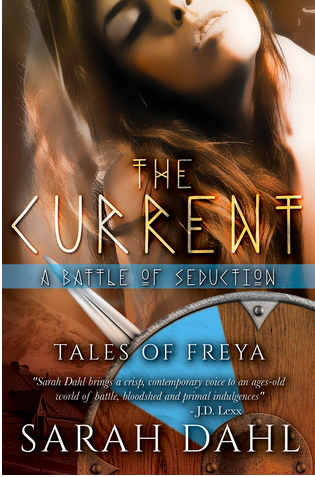
“We’re alive. You make me feel alive...”
After surviving the savage violence that comes with war, Aldaith seeks some water to wash away the grimness of the day from his skin. But he is not the only one who has sought to wash the blood from his hands and to his delight, he has an unexpected encounter.
Shield-Maiden, Nyssa, is a formidable warrior and when she wants something, she gets it. And right now, she wants Aldaith — body and soul.
The Current: A Battle of Seduction is a passionate post-battle romance between a warrior and a shield-maiden. It is unashamedly sensual as battle exhaustion is replaced with unquenchable lust.
Although the plot of this story is sexually driven, Dahl has paid close attention to the historical detailing of this book. Her writing is effortlessly authentic to the Viking era and incredibly compelling.
Tantalisingly tempting and spine-tinglingly enjoyable, The Current: A Battle for Seduction is a fabulous book in which to open this anthology.
The Awakening: Embrace Beyond Passion
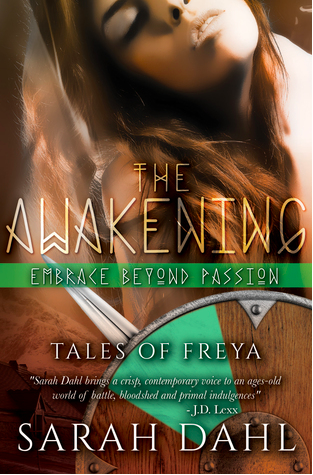
“You take what you want, Ingrid. I’m yours...”
Ingrid may well be married, but she has never felt more alone. Her husband thinks that she should be content with some beautiful jewellery and his selfish attention when he is home, but Ingrid dreams of so much more. In fact, her dreams are filled with someone who is most definitely not her husband.
The Awakening: Embrace Beyond Passion was one of my absolute favourite stories in this anthology. Ingrid and Rikard’s story is one of those that you don’t want to end. It was far too short for my liking. I could have read about their love affair for hours! It is intensely passionate and incredibly evocative. Brilliant! Loved, loved, loved it!
Monk: Captured by Temptation
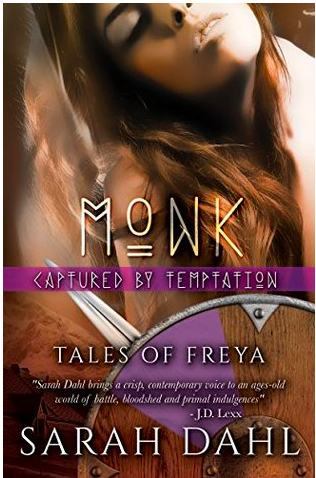
“You’re not a monk anymore…”
Alistair’s life changed the day the Vikings came. Now he is a slave, and he must make the best of it. But what he did not expect was to have feelings for his pagan mistress. Nothing must come of his desire, for he is a monk and he has taken a vow of celibacy. If only Runa were not so alluring...
Oh. My. Days! This story completely stole my breath and left me begging for more. Dahl really turned up the heat for this one. Hot! Hot! Hot! She has created wonderfully realistic characters and a very compelling storyline. Kudos, Ms Dahl.
Bonds: Under the Armour
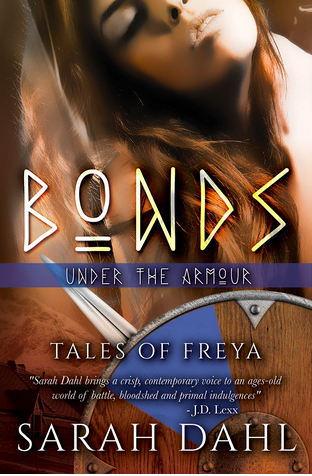
“You look ... like you came straight down from Asgard.”
It is the eve of a great battle. Aldaith and Nyssa have found a secluded spot where they can hone their fighting skills. But soon they realise that tomorrow's sunrise may well be the last one they see for nothing is assured in battle. Passion takes precedence over any last minute preparation.
This is the second book about Aldaith and Nyssa, and like The Current, Bonds is just as passionate, but with the added touch of time — the passion is tempered by love. I thought this was a beautiful story. Dahl writes with so much energy and intensity that at times, I forgot I was reading! I was swept away by this story and these characters.
Healer: The Gift of Dreams

“You unleash something I thought was buried and lost...”
Grief has crippled Magnus, and his body no longer feels like his own. He thinks he needs a healer, and that is what he gets with Audr. What he does not realise is that Audr will change his life in ways he cannot even begin to imagine.
Healer: The Gift of Dreams is a blissfully slow burning read where the passion heats up slowly until it boils over. I adored Magnus, whose heart, at the beginning of the story, has been utterly crushed. He is lost, not in the physical sense but the emotional one. Audr helps him to find himself once again and reawaken a passion that Magnus has all but forgot about. An enjoyable story about some fantastic protagonists.
Tower: Unchained by Love
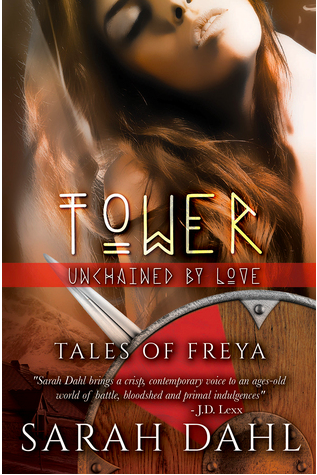
“Reminding myself of what we had was the only thing that kept me sane...”
Raven stole something very precious. He took Adisa, the woman Myskia is in love with. Myskia will do anything and everything to rescue his beloved.
The Tower is a very emotional tale. Adisa’s sense of abandonment and Myskia’s battle to find her and rescue her was incredibly moving. Their reunion was heartbreaking, but this is a story where love conquers all. Wonderful storytelling.
Battles: Sacrifices for Love
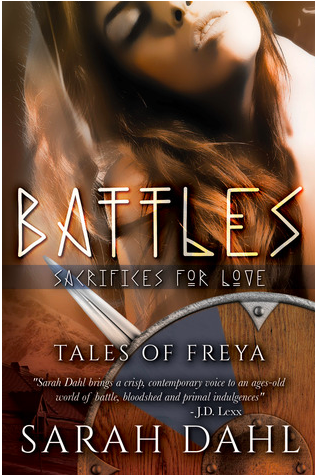
“If one of us dies, the other must follow.”
If they are to die, then let it be together. Without each other, life will lose all meaning. No one knows what tomorrow will bring, and no one can predict who will live and who will die in battle. Such things are in the hands of the Gods.
Battles: Sacrifices for Love is the third book in the story of Aldaith and Nyssa. It is also by far the most moving. In this book, Dahl has decided to add two timelines. The Viking era and the modern era, and so we follow not only Aldaith and Nyssa’s story but also the archaeologists who have discovered their grave. I thought this mixed timeline worked really well and certainly added to the tension of this story — another great read.
Tales of Freya is an evocative and sensual collection of short stories. It will awaken your senses and leave you gasping for more. I thoroughly enjoyed every minute of it.
I Highly Recommend.
Review by Mary Anne Yarde.The Coffee Pot Book Club.
Pick up your copy ofTales of FreyaAmazon UK • Amazon US
Sarah Dahl
 Sarah Dahl lives on the edge of the rural German Eifel and writes historical fiction (novels and short stories) primarily set in the Viking age. She was an editor in several German publishing houses and managed a translation agency. The magic of writing re-entered her life at UCD Dublin, where she sat in J.R.R. Tolkien’s office every day, while working on the ‘Dictionary of Hiberno-English’. Tolkien’s spirit must have done something to her creative muscles – it sure wasn’t the bland view from his office. She became a full-time writer soon after and still works as an editor, translates, and coaches new authors. She is interested in everyday life in bygone centuries and the human stories that may have occurred behind the hard, historical facts.
Sarah Dahl lives on the edge of the rural German Eifel and writes historical fiction (novels and short stories) primarily set in the Viking age. She was an editor in several German publishing houses and managed a translation agency. The magic of writing re-entered her life at UCD Dublin, where she sat in J.R.R. Tolkien’s office every day, while working on the ‘Dictionary of Hiberno-English’. Tolkien’s spirit must have done something to her creative muscles – it sure wasn’t the bland view from his office. She became a full-time writer soon after and still works as an editor, translates, and coaches new authors. She is interested in everyday life in bygone centuries and the human stories that may have occurred behind the hard, historical facts.Connect with Sarah: Website • Newsletter • Facebook • Twitter • Instagram • Goodreads.
Published on June 14, 2019 21:30
#BookReview — A Song of Sixpence: The Story of Elizabeth of York and Perkin Warbeck by Judith Arnopp #HistoricalFiction #Tudors @JudithArnopp
 A Song of SixpenceThe Story of Elizabeth of York and Perkin WarbeckBy Judith Arnopp
A Song of SixpenceThe Story of Elizabeth of York and Perkin WarbeckBy Judith Arnopp
In the aftermath of the Battle of Bosworth, a small boy is ripped from his rightful place as future king of England. His Sister Elizabeth marries the invading King, Henry Tudor.
Years later when the boy returns to claim is throne, Elizabeth is torn between love for her brother and duty to her husband.
As the final struggle between the houses of York and Lancaster is played out, Elizabeth is torn by conflicting loyalty, terror and unexpected love.
Set at the court of Henry VII, A Song of Sixpence offers a new perspective on the early years of Tudor rule. Elizabeth of York, often viewed as a meek and uninspiring queen, emerges as a resilient woman whose strengths lie in endurance rather than resistance.

“In the early days of our marriage I secretly rooted for York, but now I carry the heir in my womb, my allegiance is shifting. I am neither one thing nor the other.”
It began with a song, and it would end in one too for that was the way things were. But Elizabeth of York, daughter to Edward IV of England and Elizabeth Woodville, had no notion as she sang for her father as to the direction her life would take. She had carried a hopeful song in her heart and a secret longing for a man she could never have.
It wasn’t meant to end like this — first her father, then her brothers and now Uncle Richard. Richard was supposed to win. York was supposed to win. However, God is ever fickle with his favours, and now a Lancastrian is sat upon the throne of England.
Elizabeth has no choice. She must marry Henry Tudor and unite Lancaster and York. If she does not, then her family has nothing. Elizabeth had already lost two brothers. She would not lose her sisters and her mother, as well.
However, unity is such a fragile thing. As Henry and his mother, Lady Margaret Beaufort, set about ensuring that the House of York will never threaten Lancaster’s hold on the throne again, a rumour comes from across the sea. There is a man who is calling himself the rightful King of England, and that man is gathering an army to take back what is rightfully his.
“The day he left sanctuary was the day his life changed forever...”
Everyone thought he was dead, and some even went as far as saying his uncle had killed him. But that was not what had happened. That was not what had happened at all. Away from everything familiar, Richard of Shrewsbury, Duke of York forged a new identity, but he never forgot who he was. Henry Tudor has no claim to the throne of England. It is Richard’s by right. And he will raise an army, and he will take back the throne that his father once ruled from.
Torn between her husband and her family, Elizabeth must make a choice. Does she stay loyal to her husband, or will the call of her blood see her once again stand with the House of York?
It is not often that a book renders me speechless, but A Song of Sixpence: The Story of Elizabeth of York and Perkin Warbeck by Judith Arnopp, has done just that. From the opening sentence, I was enchanted, and by the end of the novel, even though I knew what was coming, I found myself reaching for the Kleenex as I had become so enthralled in Elizabeth and Perkin’s story.
Like any young woman, Elizabeth foolishly dreamt of falling in love. Instead, she is married to a man who is unsure of his position and is drowning in paranoia. Elizabeth can say nothing as she watches Henry strengthen his hold on his throne by destroying those who were loyal to her father and King Richard. Elizabeth is acutely aware that she is useful only because of who her father was. She can bring legitimacy to Henry’s claim to the throne. However, she is not allowed to be the queen that her mother was, and at all times, Elizabeth is eclipsed by her mother-in-law. Her relationship with Lady Margaret Beaufort “My Lady the King’s Mother” is as complicated as any woven tapestry. Elizabeth is very careful in what she says and how she acts around her mother-in-law. Elizabeth is always conscious of the fact that one wrong word could be interpreted as treason. I thought Arnopp nailed this underlying fear that Elizabeth has. Elizabeth is acutely aware that she will always be considered if not quite an enemy, something rather close to it.
The torment Elizabeth faces when she realises that she has to choose a side is utterly heartbreaking. Her motherly instinct is to protect her children at all costs, but she is also Richard’s sister, and she loves him. Arnopp demonstrates the vulnerability of Elizabeth’s situation. She may be a queen, and yet, she is a queen in name only. Her marriage, although for a time she does find a certain level of contentment, is not the marriage that her father and mother had. Elizabeth is passionate, whereas Henry is reserved. Elizabeth wants love. Henry wants an heir. Elizabeth must rely upon her Plantagenet inner strength to survive the Tudor Court. Arnopp has portrayed Elizabeth’s life as one of stifled obedience. However, what Elizabeth shows the world is not who she is or what she thinks. Her courage and her determination not to appear cowed made her utterly irresistible.
I thought Arnopp brought something new to the interpretation of Henry while staying very close to the documented history. Having spent most of his life in exile, Arnopp gives us a man who is almost afraid to allow himself to be happy and to live in the moment. Henry is always looking out for the next threat. The next danger. He is also, on the face of it, a bit of a contradiction. Henry has moments of violent ruthlessness, but then when it is least expected, his actions portray him as a merciful king. However, during these apparent acts of mercy, Arnopp has depicted Henry as being very calculated. He knows exactly what he is doing at all times. It isn’t mercy. It is politics. It is survival. His treatment of Perkin Warbeck is an excellent example of his ability to get what he wants while making himself look like a god-fearing and merciful man. I thought Arnopp did a marvellous job in her portrayal of Henry VII. He is very shrewd, very determined and yet, incredibly insecure, which makes him a dangerous man to cross.
All the books I have read in this period mention the pretender, Perkin Warbeck, and although some have hinted that Perkin was indeed Richard, Duke of York, none of them have actually portrayed Perkin as Richard. I have to commend Arnopp for her brilliant depiction of Richard. Arnopp has gathered the available sources and created an immensely appealing character and one whose story seemed so plausible that I want it to be true. We watch Richard grow from a young, frightened boy to a man who feels the call of his York blood, but at the same time, he would be quite content not to go to war and to remain forever anonymous. He is a man that loves deeply and is incredibly compassionate. At times Richard is innocently naïve, but he soon realises that not everything that shines is made of gold and that promises are nothing more than empty words.
There is one more character that deserves a mention, and that is young Henry, who would grow up to be Henry VIII. Arnopp portrayed Henry as this adorable little boy who is the apple of his mother’s eye. He is such a charismatic young man with a hint of mischief in his eyes. He loses so many people that he loves at such a young age that my heart wept for him. I loved Arnopp’s portrayal of Henry. He was a little boy who loved his mother with all his heart. His capacity for love tempered with the loss and his upbringing may go some way to explain how he became the king he was.
As I lost myself in the wonders of this book, I found myself catching my breath as I witnessed the political intrigue, the scheming, and the power struggles. All of which were told from the viewpoint of a young woman and a boy who should have been king.
I Highly Recommend.
Review by Mary Anne Yarde.The Coffee Pot Book Club.
Pick up your copy ofA Song of Sixpence Amazon UK • Amazon US
Judith Arnopp
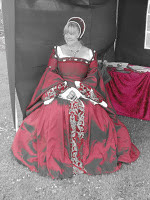 Judith Arnopp is the author of ten historical novels including The Winchester Goose, The Beaufort Chronicle (three book series), The Kiss of the Concubine and A Song of Sixpence. You can find her on Facebook • Twitter • Website • Blog.
Judith Arnopp is the author of ten historical novels including The Winchester Goose, The Beaufort Chronicle (three book series), The Kiss of the Concubine and A Song of Sixpence. You can find her on Facebook • Twitter • Website • Blog.
Published on June 14, 2019 20:30
June 13, 2019
#HistoricalFiction author, Susana Aikin, is talking about her inspiration behind her fabulous book – We Shall See the Sky Sparkling @Susana_Aikin
Inspiration for the NovelDown Labyrinthine Family History PathsBy Susana Aikin

If there was one mysterious, spellbinding female member in our family tree to look up to when I was growing up, it was our great grand aunt, Gertrude Throop Cable. The mention of her name in family gatherings always created tension. But whenever my four sisters and I, who lived in Madrid, Spain, got together with our four paternal cousins, who lived in Manchester, it was only a matter of time before speculation about Lily’s adventurous life would begin to bubble up.
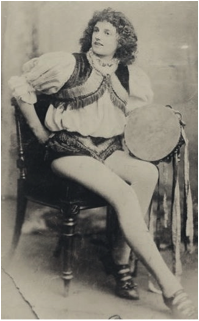 Gertrude in theatrical dancing costume.
Gertrude in theatrical dancing costume.The men in the family were not thrilled with Gertrude’s story. My father and his brothers shifted uncomfortably in their chairs when the topic was brought up. ‘She was no lady’, was their unwavering verdict. They were conservative, and having a ‘bad girl’ in the family disquieted them. Although, it had originally been one of my uncles, a passionate genealogist, who had spent years collecting photographs, letters, official certificates and older family members’ testimonies, trying to assemble the puzzle of Gertrude’s story.
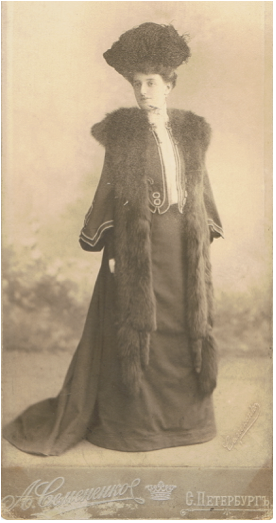 Gertrude Throop Cable
Gertrude Throop CableAnd the legend that emerged from his research went something like this: in 1898, Gertrude, then only seventeen, one of the beautiful and talented daughters of our strict Mancunian family, left the house against her father’s will to become an actress. She worked at the Imperial Theatre in London for a year or two before she joined a traveling theatre company that ended up in St. Petersburg, Russia. There she met a handsome Russian aristocrat, Sergei Nikolayevich Latvin, fell in love with him and followed him all the way east to Vladivostok, where they settled and had a baby daughter out of wedlock, Olga.
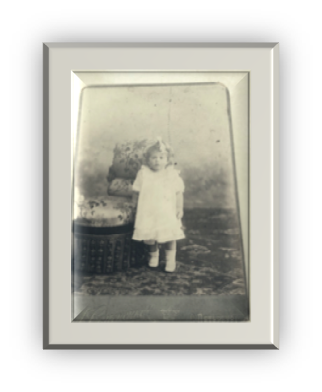 Olga, 1 year old.
Olga, 1 year old.The story got blurry at this point. For some reason, she and Sergei were separated, and Gertrude was forced to return to St. Petersburg with baby Olga. She arrived in a very bad state of health, and was diagnosed with terminal tuberculosis, after which the Russian sanitary authorities demanded she leave the country immediately. Gertrude then left her child Olga behind with Sergei’s mother, and traveled all the way back to England where she died very soon after her arrival. Her sisters kept her letters, her jewels, and the amazing fur coat she brought with her which had been a gift from her beloved. She died in 1906 at the age of 24, and the death certificate declared her to be spinster and theatrical dancer, and to die of pulmonary phthisis.
After that, all trace of baby Olga was lost to our family.
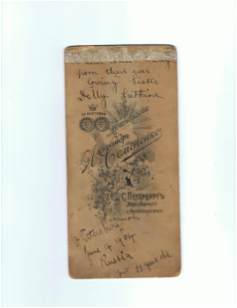 Back of picture sent from St. Petersburg, Russia, 1904.
Back of picture sent from St. Petersburg, Russia, 1904.Gertrude’s tragic death and her disappeared child were sources of a lot of speculation in our family conversations, especially the fate of baby Olga. What had happened to the little girl? Did she perish afterwards in the Russian Revolution? But Gertrude’s charisma outshone all else—to have an ancestress who had defied all conventions to pursue an artistic career bestowed a very particular badge on the women of the clan.
Years later, after I left my family and my homeland and moved to New York to become a filmmaker and a writer, I thought many times about Gertrude and her solo flight across Russia at the end of the 19th century. Plowing through the hardship of growing into an artist in a difficult, competitive world dominated–still today–by men, is a hard predicament for any woman at any time and place in history.
Only recently did it occur to me, one idle Sunday evening, to google Gertrude’s name, and when she popped up immediately under ancestry.com’s website, I knew I was in for a trip down the rabbit hole. The first surprise was to find her photograph uploaded onto another family tree: the descendants of her daughter Olga listed her as their grandmother. I learned instantly that Olga had survived and lived an interesting, rich life, had married into a wealthy Ukrainian family and migrated eventually to the US in the 1950s.
The picture her family had uploaded onto the site was very similar to the photo my mother kept on top of her writing desk in the living room. In both images, Gertrude is richly dressed in a long elegant coat with a fur stole that reaches below her knees, and a large, elaborate hat dressed with something resembling ostrich plumes, or some other exotic bird’s feather. Both photographs were taken in Saint Petersburg in 1900.
I immediately got in touch with her grandchildren, who were very generous in providing information to fill in the gaps of her story. The most important piece I obtained was the copy of a short life memoir written by Olga herself, in which besides narrating her own life, she recounts everything she knew about her mother. This is how it starts:
I was born in Vladivostok, Maritime Province of the Russian Far East, on January 6, 1903. My father was Sergei Nikolayevich Latkin, Commissioner of the Customs for the Far East. My mother was Gertrude Throop-Cable.
During the Russo-Japanese war in 1904 my mother took me to St. Petersburg, while my father remained as a war correspondent there. The Trans-Siberian railroad had not been built, or completed at that time. We had to cross the Lake Baikal on sleighs, it was winter and my mother contracted a cold, which due to her weak lungs developed into tuberculosis... I do not remember her, since I was only 1 1/2 years old… From what I was told and the photography I have, she was a beautiful woman. Artists always asked my father to have her sit for a painting.
The moment I started reading this document, I thought about writing a novel.
The rest, as they say, is history.
 Map of the Trans-Siberian Railroad
Map of the Trans-Siberian RailroadWe Shall See the Sky SparklingBy Susana Aikin
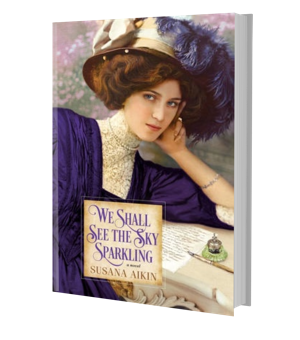 Set in London and Russia at the turn of the century, Susana Aikin’s debut introduces a vibrant young woman determined to defy convention and shape an extraordinary future.
Set in London and Russia at the turn of the century, Susana Aikin’s debut introduces a vibrant young woman determined to defy convention and shape an extraordinary future.
Like other well-bred young women in Edwardian England, Lily Throop is expected to think of little beyond marriage and motherhood. Passionate about the stage, Lily has very different ambitions. To her father’s dismay, she secures an apprenticeship at London’s famous Imperial Theatre. Soon, her talent and beauty bring coveted roles and devoted admirers. Yet to most of society, the line between actress and harlot is whisper-thin. With her reputation threatened by her mentor’s vicious betrayal, Lily flees to St. Petersburg with an acting troupe—leaving her first love behind.
Life in Russia is as exhilarating as it is difficult. The streets rumble with talk of revolution, and Lily is drawn into an affair with Sergei, a Count with fervent revolutionary ideals. Following Sergei when he is banished to Vladivostok, Lily struggles to find her role in an increasingly dangerous world. And as Russian tensions with Japan erupt into war, only fortitude and single-mindedness can steer her to freedom and safety at last.
With its sweeping backdrop and evocative details, We Shall See the Sky Sparkling explores a fascinating period in history through the eyes of a strong-willed, singular heroine, in a moving story of love and resilience.
"Aikin’s novel is expertly plotted and rife with historical details in both its English and Russian settings, making for a rich story of the prejudices women faced at the turn of the 20th century and how the class disparity in Russia ignited the flame of revolution."
PUBLISHERS WEEKLY
"Beginning and ending with letters written to her family, this novel has the feel of a serial drama. Readers of Pam Jenoff and Eva Stachniak will appreciate the strong-willed and artistically driven female character who finds her own way through difficult times."
LIBRARY JOURNAL
Pick up your copy ofWe Shall See the Sky SparklingAmazon UK • Amazon US
Susana Aikin
 Born in Spain of an English father and a Spanish mother, Susana Aikin is a writer and a filmmaker who has lived in New York City since 1982. She was educated in England and Spain; studied law at the University of Madrid, and later Creative Writing at Manchester Metropolitan University, UK. In 1986 she started her own independent film production company, Starfish Productions, producing and directing documentary films that won her multiple awards, including an American Film Institute grant, a Rockefeller Fellowship and an Emmy Award in 1997. She started writing fiction full time in 2010. She has two sons, and now lives between Brooklyn and the mountains north of Madrid. Her debut novel, WE SHALL SEE THE SKY SPARKLING, was published by Kensington Books, in February 2019.
Born in Spain of an English father and a Spanish mother, Susana Aikin is a writer and a filmmaker who has lived in New York City since 1982. She was educated in England and Spain; studied law at the University of Madrid, and later Creative Writing at Manchester Metropolitan University, UK. In 1986 she started her own independent film production company, Starfish Productions, producing and directing documentary films that won her multiple awards, including an American Film Institute grant, a Rockefeller Fellowship and an Emmy Award in 1997. She started writing fiction full time in 2010. She has two sons, and now lives between Brooklyn and the mountains north of Madrid. Her debut novel, WE SHALL SEE THE SKY SPARKLING, was published by Kensington Books, in February 2019.Connect with Susana: Website • Twitter • Facebook.
Published on June 13, 2019 22:00
June 12, 2019
Have you heard? Louisa Treger is giving away a copy of her fabulous book — The Dragon Lady #NewRelease #Giveaway #HistoricalFiction @louisatreger

All you need to do is answer this question:
If you could ask any historical figure a question, who would it be and what would you ask them?
Leave your answer in the comments at the bottom of this post.
Giveaway Rules
• Leave your answer in the comments at the bottom of this post.• Giveaway ends at 11:59pm BST on June 25th.You must be 18 or older to enter.• Giveaway is only open Internationally.•Only one entry per household.• All giveaway entrants agree to be honest and not cheat the systems; any suspect of fraud is decided upon by blog/site owner and the sponsor, and entrants may be disqualified at our discretion.•Winners will be announced in the comments.• Winner has 48 hours to claim prize or new winner is chosen.
Pick up your copy ofThe Dragon LadyAmazon• Waterstones• The Hive • Bloomsbury
Read The CoffeePot Book Club Book Review of The Dragon Lady.
Louisa Treger
 Louisa Treger is a classical violinist who turned to literature, earning a Ph.D in English at University College London, where she focused on early-twentieth-century women's writing and was awarded the Rosa Morison Scholarship 'for distinguished work in the study of English Language and Literature.' Louisa's first novel, The Lodger, was published by Macmillan in 2014. The Dragon Ladyis her second novel (Bloomsbury, 2019). She lives in London.
Louisa Treger is a classical violinist who turned to literature, earning a Ph.D in English at University College London, where she focused on early-twentieth-century women's writing and was awarded the Rosa Morison Scholarship 'for distinguished work in the study of English Language and Literature.' Louisa's first novel, The Lodger, was published by Macmillan in 2014. The Dragon Ladyis her second novel (Bloomsbury, 2019). She lives in London. Connect with Louisa: Website • Facebook • Twitter.
Published on June 12, 2019 23:00
Celebrating 35 years of Robin of Sherwood — Exclusive "Spoof "Guest Interview with Arthur the Rat! By Carole Ballard @Carole_E_B
Celebrating 35 years of Robin of Sherwood.
Exclusive Spoof Guest Interview
Arthur the Rat!
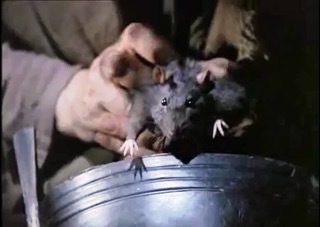
One of the most beloved characters in Robin of Sherwood was not Robin or his band of merry men, in fact, he wasn’t even human. Arthur was the adorable dungeon rat and today he has taken time out of his very busy schedule to chat to us.
Hello Arthur, it is so lovely you could join us today!
Charmed, I am sure!
When I think of Robin of Sherwood your character always springs to mind. How did the role come to your attention?
I was minding my business on the set one day and there was some food out in one of the early episodes, well I couldn't resist! So, I took a shot at the food but sadly found it was that Styrofoam stuff you know? It was 'all' fake? Everything, even the deer Robin carries on his shoulder when suddenly this guy from wardrobe picked me up and asked me if I wanted to do a one-off episode.
Well, I jumped at the chance! Throughout my whole life, I had been mingling in theatres with the acting classes having attended RADA, etc. Oh yes, I was at RADA… Impressed aren't you darling?
I'd been in theatre for a long time, just behind the scenes and I thought it was my opportunity to get some really class acting in.
I was introduced to Stuart Linden, and we had a very good working relationship. I was supposed to do a run on part initially, just across the set but Stuart and I thought it a good idea that we had a bond in the series and he had me as his pet and carried me around. So, he often made comments about me and to me, which brought out and enabled him to develop his fabulous character of this, old, off his head geezer in a dungeon. I can tell you though, seriously, it wasn't him carrying me, I carried him, you know, I really did darling!
If it weren't for me, his lines would have meant nothing. I think he bounced his lines off against me and I carried the puns you know? I was supposed to have a speaking role and only be in the first episode, but they loved me and kept me on even though I didn't get many lines, just the odd squeak here and there.
How much influence did you have on your character's role in Robin of Sherwood and indeed, the series as a whole?
Well, firstly I think the old prisoner was invented as a means to get out of a writing problem. They had to get the 'Merries' out of prison in one particular episode, and because they were in a kind of dungeon pit, there were no ladders see. So, they had to stand on each other's shoulders, and the old prisoner was the bottom rung on the human ladder, and they got out by standing on him. However, Stu as I called him and I become fond favourites by Kip Carpenter and despite the ladies, not taking to me, you know me being all ratty and such, he kept us both on. Personally, I think we were the success of the whole series, to be honest, I mean I know the others can act, but they couldn't squeak like I could, so who else could do that part?
Plus, Stuart was just referred to as "the old prisoner"! I had a name! Arthur! Though he could never say it correctly, he had a common tone and used to use an f, rather than an eloquent th, but, then I supposed he was playing a role, but 'Arfur,' ohh dear, so common.
ArTHUR dear! It's ArTHUR! I kept telling him.
I am sure everyone wants to know — did you ever get out of the dungeon?
No, I did not! and do you know I was rather frustrated at that? I could have really honed my skills but when the old goat DID get out, his line “he wanted to get back to Arfur”, meant he’d left me in the pit! Had he not have thought to take me with him? A bit of sunlight for me perhaps? Come on we could have asked Kip to write that one in Stuart!!! I think he was a little annoyed I had all the limelight in our scenes.
How many episodes were you in?
I was in five or six, I did well in the series, the donkey only got a couple I think and those darn pigs, Oh God, and they made so much noise and so much trouble. All they had to do was be caught? What did they do? Led the Merries a right Royal dance I can tell you! Sigh, see, they were not drama trained like me so what can you expect and they got them from a local farm, they were not on Spotlight.
Anyway back to me darling, yes I was on five episodes maybe six? The Sheriff of Nottingham, The Power of Albion, The prophecy, The Witch of Elsdon and Robin Hood and the Sorcerer, across all three seasons; it’s 35 years ago dear and I’ve played in more things since then.
How long were you meant to be in the dungeon for?
Well, Stuart in character tells De Rainault he has been in the dungeon I think 27 years! But who knows? To be fair De Rainault doesn’t refute him or anything, so I it could be true! He was rather beardy and decrepit looking.
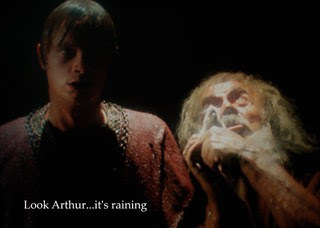
It was quiet moving and I acted my socks off dear to show it, I can tell you, in the bits that showed the Old Prisoner refused to flee and not part with me. I remember his classic line of “the only way out is feet first” “Feet first Arfur”, he used to say, must have heard that 100 times in rehearsal.
What it meant of course was the only way he’d get out the dungeon was if he was dead and that was the ‘only’ way to get out. However, rats are clever and I’d already discussed with Esta Charkham that if the Old Prisoner did die, I would be able to continue working on the series in a minor role so my future was pretty safe.
Did you get any perks?
They did want to pay me in cheese but, I ask you? Rats cannot live on cheese alone, so I actually managed to get a living wage AND the cheese, so I guess that was a perk, but I never really socialised with the cast after but, Michael Praed and I got on fabulously and we often spent many an evening after work at his place so friendship was a perk.
Did you have to have special training for the part?
Darling, I’m an Actor! I had already had previous training in biting, singing and Mouseical arts and I can say my name backwards and forwards in Greek, Arabic and German. So obviously my talents where recognised for the show.
What is your favourite episode?
It has to be the one where Robin was killed. I remember it well, the cast had read the script and everyone lost their appetites at this sudden news that Michael was leaving, so I got in there and finished off their lunches. A very good episode for me.
What do you think of the new Robin of Sherwood Audios?
Well, they are very good, but I’m not in them. I think I would be good at audio.
Have you managed to act in many other things since Robin of Sherwood?
I had a voice over part in Ratatouille in 2007 but you can’t see ‘ME’ as an actor playing a part, as it was just my voice.
And I had a walk on part in the Nun’s scene in the latest “Good Omens”, but the set was very dark but if you look you can see me. I shall be also doing comic-cons very soon.
Thank you so much Arfur, sorry, I mean Arthur, for this delightful interview
A pleasure darling, and if you know of any good parts, here is my card; oh, sorry, I’ve nibbled the end of that one.
© Carole Ballard 2019
Exclusive Spoof Guest Interview
Arthur the Rat!

One of the most beloved characters in Robin of Sherwood was not Robin or his band of merry men, in fact, he wasn’t even human. Arthur was the adorable dungeon rat and today he has taken time out of his very busy schedule to chat to us.
Hello Arthur, it is so lovely you could join us today!
Charmed, I am sure!
When I think of Robin of Sherwood your character always springs to mind. How did the role come to your attention?
I was minding my business on the set one day and there was some food out in one of the early episodes, well I couldn't resist! So, I took a shot at the food but sadly found it was that Styrofoam stuff you know? It was 'all' fake? Everything, even the deer Robin carries on his shoulder when suddenly this guy from wardrobe picked me up and asked me if I wanted to do a one-off episode.
Well, I jumped at the chance! Throughout my whole life, I had been mingling in theatres with the acting classes having attended RADA, etc. Oh yes, I was at RADA… Impressed aren't you darling?
I'd been in theatre for a long time, just behind the scenes and I thought it was my opportunity to get some really class acting in.
I was introduced to Stuart Linden, and we had a very good working relationship. I was supposed to do a run on part initially, just across the set but Stuart and I thought it a good idea that we had a bond in the series and he had me as his pet and carried me around. So, he often made comments about me and to me, which brought out and enabled him to develop his fabulous character of this, old, off his head geezer in a dungeon. I can tell you though, seriously, it wasn't him carrying me, I carried him, you know, I really did darling!
If it weren't for me, his lines would have meant nothing. I think he bounced his lines off against me and I carried the puns you know? I was supposed to have a speaking role and only be in the first episode, but they loved me and kept me on even though I didn't get many lines, just the odd squeak here and there.
How much influence did you have on your character's role in Robin of Sherwood and indeed, the series as a whole?
Well, firstly I think the old prisoner was invented as a means to get out of a writing problem. They had to get the 'Merries' out of prison in one particular episode, and because they were in a kind of dungeon pit, there were no ladders see. So, they had to stand on each other's shoulders, and the old prisoner was the bottom rung on the human ladder, and they got out by standing on him. However, Stu as I called him and I become fond favourites by Kip Carpenter and despite the ladies, not taking to me, you know me being all ratty and such, he kept us both on. Personally, I think we were the success of the whole series, to be honest, I mean I know the others can act, but they couldn't squeak like I could, so who else could do that part?
Plus, Stuart was just referred to as "the old prisoner"! I had a name! Arthur! Though he could never say it correctly, he had a common tone and used to use an f, rather than an eloquent th, but, then I supposed he was playing a role, but 'Arfur,' ohh dear, so common.
ArTHUR dear! It's ArTHUR! I kept telling him.
I am sure everyone wants to know — did you ever get out of the dungeon?
No, I did not! and do you know I was rather frustrated at that? I could have really honed my skills but when the old goat DID get out, his line “he wanted to get back to Arfur”, meant he’d left me in the pit! Had he not have thought to take me with him? A bit of sunlight for me perhaps? Come on we could have asked Kip to write that one in Stuart!!! I think he was a little annoyed I had all the limelight in our scenes.
How many episodes were you in?
I was in five or six, I did well in the series, the donkey only got a couple I think and those darn pigs, Oh God, and they made so much noise and so much trouble. All they had to do was be caught? What did they do? Led the Merries a right Royal dance I can tell you! Sigh, see, they were not drama trained like me so what can you expect and they got them from a local farm, they were not on Spotlight.
Anyway back to me darling, yes I was on five episodes maybe six? The Sheriff of Nottingham, The Power of Albion, The prophecy, The Witch of Elsdon and Robin Hood and the Sorcerer, across all three seasons; it’s 35 years ago dear and I’ve played in more things since then.
How long were you meant to be in the dungeon for?
Well, Stuart in character tells De Rainault he has been in the dungeon I think 27 years! But who knows? To be fair De Rainault doesn’t refute him or anything, so I it could be true! He was rather beardy and decrepit looking.

It was quiet moving and I acted my socks off dear to show it, I can tell you, in the bits that showed the Old Prisoner refused to flee and not part with me. I remember his classic line of “the only way out is feet first” “Feet first Arfur”, he used to say, must have heard that 100 times in rehearsal.
What it meant of course was the only way he’d get out the dungeon was if he was dead and that was the ‘only’ way to get out. However, rats are clever and I’d already discussed with Esta Charkham that if the Old Prisoner did die, I would be able to continue working on the series in a minor role so my future was pretty safe.
Did you get any perks?
They did want to pay me in cheese but, I ask you? Rats cannot live on cheese alone, so I actually managed to get a living wage AND the cheese, so I guess that was a perk, but I never really socialised with the cast after but, Michael Praed and I got on fabulously and we often spent many an evening after work at his place so friendship was a perk.
Did you have to have special training for the part?
Darling, I’m an Actor! I had already had previous training in biting, singing and Mouseical arts and I can say my name backwards and forwards in Greek, Arabic and German. So obviously my talents where recognised for the show.
What is your favourite episode?
It has to be the one where Robin was killed. I remember it well, the cast had read the script and everyone lost their appetites at this sudden news that Michael was leaving, so I got in there and finished off their lunches. A very good episode for me.
What do you think of the new Robin of Sherwood Audios?
Well, they are very good, but I’m not in them. I think I would be good at audio.
Have you managed to act in many other things since Robin of Sherwood?
I had a voice over part in Ratatouille in 2007 but you can’t see ‘ME’ as an actor playing a part, as it was just my voice.
And I had a walk on part in the Nun’s scene in the latest “Good Omens”, but the set was very dark but if you look you can see me. I shall be also doing comic-cons very soon.
Thank you so much Arfur, sorry, I mean Arthur, for this delightful interview
A pleasure darling, and if you know of any good parts, here is my card; oh, sorry, I’ve nibbled the end of that one.
© Carole Ballard 2019
Published on June 12, 2019 09:00
June 11, 2019
A Conversation with #HistoricalFiction author, Cryssa Bazos. Cryssa is also giving away one paperback copy of her fabulous book — Severed Knot #HistoricalRomance #Stuarts @CryssaBazos
A Conversation with Historical Fiction author,Cryssa Bazos.
Hi Cryssa, welcome back to Myths, Legends, Books & Coffee Pots… Before we please tell us a little about yourself?
Hi, everyone! I’m Cryssa Bazos, and I’m a historical fiction author who is (somewhat) obsessed with 17th century England, particularly the time of the English Civil War. It’s an era of significant change in society, literacy, science, technology and exploration. I can’t think of a more fascinating century to write about.
I adored your book, Traitor’s Knot, and it was actually named The Coffee Pot Book Club Book Of The Year in 2017, so if you have not read it yet then you really need to check it out!
What inspired you to write Severed Knot?
After nine years of conflict, the final battle of the civil war played out at Worcester between Charles Stuart (future Charles II) and Oliver Cromwell’s Parliamentarian forces. I featured that event in my first novel, Traitor’s Knot, and in Severed Knot I wanted to show the aftermath of war. Most didn’t actually die on the battlefield, instead, many died of their wounds or from poor conditions during their imprisonment. Thousands of Scottish prisoners of war faced transportation to the colonies, including Barbados. Those who survived the gruelling eight-week journey, found themselves indentured to sugar plantations. I was fascinated by how their lives would have been irrevocably changed. They went from fighting for their king, proud men all, to being reduced to bondsmen, forced to serve several years far from home. Many never returned.
 The Battle of Worcester, published by Machell Stace.
The Battle of Worcester, published by Machell Stace.
Severed Knot sounds fabulous! What were the challenges you faced in researching this period of history?
Scottish PoWs were sent to the New England Colonies and Barbados. There were good records for hundreds of prisoners who ended up in New England thanks to ship’s logs, but we don’t have the same rich information about the men who ended up in Barbados. I had to rely on the account of a German mercenary who had been one of the POWs sent to Barbados as well and tap into contemporary accounts of life on a plantation to build my story world.
There are many books about the Stuart Age. Can you tell us three things that set your novels apart?
Severed Knot is uniquely set in colonial Barbados and focuses on a chapter of history rarely touched upon—PoW’s being transported to the West Indies to work as indentured servants in the sugarcane fields. Barbados is a relatively new English colony at that time and sugar was just being established as a major cash crop.

Although I’m a history geek, I’m equally a romance nut. For me, a satisfying story includes romance, even if it is only a minor sub-plot. There’s very little historical romance set during the 17th century—the majority is still set during the Regency. Severed Knot has been described as historical romantic suspense. I’ve challenged my lovers by throwing them into a life and death situation, while their relationship matures and evolves against this backdrop.
The 17th century is starting to gain traction in historical fiction, and I’m delighted to see more and more set during this era. The Restoration is a favourite setting for many novels of this era, but I love the messy, uncertain time that preceded it when England became a fledgling Commonwealth. The Royalists spent these several years plotting and planning to reinstate the monarchy while the Parliamentarian victors moved further away from the ideals that propelled them to rebel against the king.
Thank you so much for taking the time out of you day to chat with us. Before you go, can you tell us what are you currently working on?
I’m working on a third book which will feature one of my favourite side characters—Nathaniel Lewis, barrister of Lincoln’s Inn, a morally ambiguous character who is an agent of the exiled Charles Stuart. He’s an absolute delight to write and has scores of secrets. His story will involve spies, intrigue and political expediency.
Scroll down to be in with a chance to win a paperback copy of Severed Knot.
Severed KnotBy Cryssa Bazos

Barbados 1652. In the aftermath of the English Civil War, the vanquished are uprooted and scattered to the ends of the earth.
When marauding English soldiers descend on Mairead O’Coneill’s family farm, she is sold into slavery. After surviving a harrowing voyage, the young Irish woman is auctioned off to a Barbados sugar plantation where she is thrust into a hostile world of depravation and heartbreak. Though stripped of her freedom, Mairead refuses to surrender her dignity.
Scottish prisoner of war Iain Johnstone has descended into hell. Under a blazing sun thousands of miles from home, he endures forced indentured labour in the unforgiving cane fields. As Iain plots his escape to save his men, his loyalties are tested by his yearning for Mairead and his desire to protect her.
With their future stolen, Mairead and Iain discover passion and freedom in each other’s arms. Until one fateful night, a dramatic chain of events turns them into fugitives.Together they fight to survive; together they are determined to escape.
Excerpt
Sunlight sparkled on the water. A slight breeze rippled the otherwise still water. Another splash. At first, Mairead didn't see anything, then someone surfaced. A man, skimming across the pond, arms and legs slicing through the water. Even before he turned, she knew who it was. Johnstone.
Mairead knew she should back away and leave before he caught her watching—he’d be insufferable otherwise. That, or bark her head off as any self-respecting ogre. And yet something pinned her to the spot.
He dove into the water, his body curving with a flash of his naked buttocks.
Mairead’s eyes widened, and she edged closer. When he split the surface of the lake, he caused a spray of water drops to splatter. He stood facing her direction, eyes closed. Raising his hands to his head, he slicked back his dark blond hair.
Mairead didn’t dare move. She watched how the muscles in his arms flexed. Her eyes travelled across his broad chest with its light mat of hair. A trail of darkish hair ran down from chest to stomach until it disappeared below the pond’s surface. Mairead craned her head to peer into the pond, but the water was murky and brownish-green.
Johnstone dove under again. Mairead sat back on her heels and nibbled her fingertip, considering her options. She really should leave. A smile played at the corner of her mouth as she made herself more comfortable.
Johnstone surfaced and began to paddle lazily in the water. His head was tipped backwards, his face presented to the sun. His skin had become tanned and gleamed against the lapping water.
Mairead watched, captivated. He seemed at one with the water. She didn’t know too many who could swim, and none so well. Her own brothers had enjoyed a quick barrelling leap into the river back home, splashing like mad puppies and thrashing in the water. They had taught her to float, but swimming across the water as this Scotsman was now doing, with strong, purposeful strokes, was an art, and one she admired greatly. So she told herself.
After a few moments, prudence whispered that she had stayed long enough. Mairead rose from her crouch, careful not to rustle a leaf, but just as she moved Johnstone finished his swim and headed back to the bank. Mairead dropped to the ground again so he wouldn’t notice her.
Johnstone slowly waded out of the water, all glorious and dripping. Mairead’s breath locked in her throat. She took in that expanse of chest, the tapered waist then . . . Blessed Mother of Jesus.
She made a slight choking sound, and Johnstone stopped to look around.
“Who’s there?” he called out in her direction.
Mairead’s face flooded. He would never let her live this down. She had to get away from here without him seeing her.
No time for discretion.
Mairead darted for the trail. She risked a glance over her shoulder to catch a glimpse of Johnstone yanking on his breeches. And that was her downfall. Literally. A root hooked her foot, and she crashed to the ground with a cry. Then she heard him thrashing through the brush behind her. Mairead scrambled to her feet and managed to take a few more strides before he caught up with her, grabbing a fistful of her petticoat in his hand.
Mairead twisted around and found herself face-to-face with Iain Locharbaidh Johnstone. It was one thing to gawk at the man from a distance but to be this close to his still-wet chest squeezed the breath from her lungs. She averted her eyes, not sure where she could safely look, and her gaze landed on his unlaced breeches. More wet skin. Heat flooded her cheeks.
“Oh!”
Johnstone released her and swore under his breath while he laced up his breeches. “What were you doing, woman?”
“Nothing! I . . . I came down for a wash.”
“Do you always hide in the shrubs when taking a wash?” His eyes narrowed, causing her to squirm. “Here’s a tip, lass, the water works far better. Not sure what they do in Ireland, but that’s how it’s done in Scotland.”
“I was not hiding in the shrubs.” Mairead hid her crossed fingers in the folds of her petticoat and searched lamely for an adequate rebuttal. “I had only reached the shrubs when you starting crashing around like a mad man. And don’t you dare disparage my homeland with your poor attempt of humour.”
“How long were you watching me?”
Mairead felt her face blaze. “I was not watching you, to be sure. Have you not heard a thing I’ve said?”
He folded his arms across his chest and quirked his brow. “Building a nest in the shrubs, then, like a wee mouse?”
“Stop calling me a mouse,” Mairead said, now with true outrage. Small and insignificant—was she always to be thought this way? No one ever compared Ciara to a mouse. Not even Bronagh—a shrew, perhaps, but never a mouse.
The corners of his mouth lifted slightly. “Aye, you were watching.”
She knew it—she knew he’d be insufferable! “I didn’t know who was in the pond and the moment . . . the moment I discovered who it was . . . For certain, it could have been anyone . . . even . . . even Masterton the Younger.”
Johnstone quirked a brow, amusement playing across his features. Mairead’s gaze latched on to his deepening smile, and she only now noticed the firmness of his jaw and how the droplets of water clung to his blond whiskers.
Mairead tore her eyes away and forced herself to meet his eyes. “What? What do you find so amusing?”
“Not sure where to start.” Was that laughter in his voice?
Mairead’s inner voice sat her down and delivered a stern lecture. Concede the field, Mairead. Retreat now. No shame in admitting defeat. And yet she dashed the voice of reason and found herself saying, “Make an effort. Explain it to me.”
“You thought you were ogling Masterton?”
Mairead’s jaw dropped. “I never said—”
Johnstone’s teeth flashed in a smile. “He’ll be flattered, lass, but
I’d steer clear of his wife, were I you. She’ll not think twice to chase you off the croft with a broom.”
“I never said I was ogling him!”
“Oh aye? But you were ogling someone?”
Mairead sucked in her breath. “You. Are. An. Impossible. Man!”
She finally did what her good sense had urged her to do earlier. She whirled around and fled the field.
Giveaway
Cryssa Bazos is giving away one paperback copy of “Severed Knot.”

All you need to do is answer this question:
If you had access to the Tardis, what historical period would you want to visit?
Leave your answer in the comments at the bottom of this post.
Giveaway Rules
• Leave your answer in the comments at the bottom of this post.• Giveaway ends at 11:59pm BST on June 26th.You must be 18 or older to enter. • Giveaway is open Internationally. •Only one entry per household.
Pick up your copy ofSevered KnotAmazon • Books2Read
Cryssa Bazos
 Cryssa Bazos is an award-winning historical fiction author and 17th-century enthusiast with a particular interest in the English Civil War. She is a member of the Historical Novel Society, the Romantic Novelist Association and is a co-editor and contributor of the English Historical Fiction Authors blog. Her debut novel, Traitor's Knot, is published by Endeavour Media. Traitor's Knot is the Medalist winner of the 2017 New Apple Award (historical fiction), a finalist for the 2018 EPIC eBook Awards (historical romance) and the RNA Joan Hessayon Award. Her second novel, Severed Knot, was longlisted for the Historical Novel Society 2018 New Novel Award.
Cryssa Bazos is an award-winning historical fiction author and 17th-century enthusiast with a particular interest in the English Civil War. She is a member of the Historical Novel Society, the Romantic Novelist Association and is a co-editor and contributor of the English Historical Fiction Authors blog. Her debut novel, Traitor's Knot, is published by Endeavour Media. Traitor's Knot is the Medalist winner of the 2017 New Apple Award (historical fiction), a finalist for the 2018 EPIC eBook Awards (historical romance) and the RNA Joan Hessayon Award. Her second novel, Severed Knot, was longlisted for the Historical Novel Society 2018 New Novel Award.
Connect with Cryssa: Website • Facebook • Twitter.
Hi Cryssa, welcome back to Myths, Legends, Books & Coffee Pots… Before we please tell us a little about yourself?
Hi, everyone! I’m Cryssa Bazos, and I’m a historical fiction author who is (somewhat) obsessed with 17th century England, particularly the time of the English Civil War. It’s an era of significant change in society, literacy, science, technology and exploration. I can’t think of a more fascinating century to write about.
I adored your book, Traitor’s Knot, and it was actually named The Coffee Pot Book Club Book Of The Year in 2017, so if you have not read it yet then you really need to check it out!
What inspired you to write Severed Knot?
After nine years of conflict, the final battle of the civil war played out at Worcester between Charles Stuart (future Charles II) and Oliver Cromwell’s Parliamentarian forces. I featured that event in my first novel, Traitor’s Knot, and in Severed Knot I wanted to show the aftermath of war. Most didn’t actually die on the battlefield, instead, many died of their wounds or from poor conditions during their imprisonment. Thousands of Scottish prisoners of war faced transportation to the colonies, including Barbados. Those who survived the gruelling eight-week journey, found themselves indentured to sugar plantations. I was fascinated by how their lives would have been irrevocably changed. They went from fighting for their king, proud men all, to being reduced to bondsmen, forced to serve several years far from home. Many never returned.
 The Battle of Worcester, published by Machell Stace.
The Battle of Worcester, published by Machell Stace.Severed Knot sounds fabulous! What were the challenges you faced in researching this period of history?
Scottish PoWs were sent to the New England Colonies and Barbados. There were good records for hundreds of prisoners who ended up in New England thanks to ship’s logs, but we don’t have the same rich information about the men who ended up in Barbados. I had to rely on the account of a German mercenary who had been one of the POWs sent to Barbados as well and tap into contemporary accounts of life on a plantation to build my story world.
There are many books about the Stuart Age. Can you tell us three things that set your novels apart?
Severed Knot is uniquely set in colonial Barbados and focuses on a chapter of history rarely touched upon—PoW’s being transported to the West Indies to work as indentured servants in the sugarcane fields. Barbados is a relatively new English colony at that time and sugar was just being established as a major cash crop.

Although I’m a history geek, I’m equally a romance nut. For me, a satisfying story includes romance, even if it is only a minor sub-plot. There’s very little historical romance set during the 17th century—the majority is still set during the Regency. Severed Knot has been described as historical romantic suspense. I’ve challenged my lovers by throwing them into a life and death situation, while their relationship matures and evolves against this backdrop.
The 17th century is starting to gain traction in historical fiction, and I’m delighted to see more and more set during this era. The Restoration is a favourite setting for many novels of this era, but I love the messy, uncertain time that preceded it when England became a fledgling Commonwealth. The Royalists spent these several years plotting and planning to reinstate the monarchy while the Parliamentarian victors moved further away from the ideals that propelled them to rebel against the king.
Thank you so much for taking the time out of you day to chat with us. Before you go, can you tell us what are you currently working on?
I’m working on a third book which will feature one of my favourite side characters—Nathaniel Lewis, barrister of Lincoln’s Inn, a morally ambiguous character who is an agent of the exiled Charles Stuart. He’s an absolute delight to write and has scores of secrets. His story will involve spies, intrigue and political expediency.
Scroll down to be in with a chance to win a paperback copy of Severed Knot.
Severed KnotBy Cryssa Bazos

Barbados 1652. In the aftermath of the English Civil War, the vanquished are uprooted and scattered to the ends of the earth.
When marauding English soldiers descend on Mairead O’Coneill’s family farm, she is sold into slavery. After surviving a harrowing voyage, the young Irish woman is auctioned off to a Barbados sugar plantation where she is thrust into a hostile world of depravation and heartbreak. Though stripped of her freedom, Mairead refuses to surrender her dignity.
Scottish prisoner of war Iain Johnstone has descended into hell. Under a blazing sun thousands of miles from home, he endures forced indentured labour in the unforgiving cane fields. As Iain plots his escape to save his men, his loyalties are tested by his yearning for Mairead and his desire to protect her.
With their future stolen, Mairead and Iain discover passion and freedom in each other’s arms. Until one fateful night, a dramatic chain of events turns them into fugitives.Together they fight to survive; together they are determined to escape.
Excerpt
Sunlight sparkled on the water. A slight breeze rippled the otherwise still water. Another splash. At first, Mairead didn't see anything, then someone surfaced. A man, skimming across the pond, arms and legs slicing through the water. Even before he turned, she knew who it was. Johnstone.
Mairead knew she should back away and leave before he caught her watching—he’d be insufferable otherwise. That, or bark her head off as any self-respecting ogre. And yet something pinned her to the spot.
He dove into the water, his body curving with a flash of his naked buttocks.
Mairead’s eyes widened, and she edged closer. When he split the surface of the lake, he caused a spray of water drops to splatter. He stood facing her direction, eyes closed. Raising his hands to his head, he slicked back his dark blond hair.
Mairead didn’t dare move. She watched how the muscles in his arms flexed. Her eyes travelled across his broad chest with its light mat of hair. A trail of darkish hair ran down from chest to stomach until it disappeared below the pond’s surface. Mairead craned her head to peer into the pond, but the water was murky and brownish-green.
Johnstone dove under again. Mairead sat back on her heels and nibbled her fingertip, considering her options. She really should leave. A smile played at the corner of her mouth as she made herself more comfortable.
Johnstone surfaced and began to paddle lazily in the water. His head was tipped backwards, his face presented to the sun. His skin had become tanned and gleamed against the lapping water.
Mairead watched, captivated. He seemed at one with the water. She didn’t know too many who could swim, and none so well. Her own brothers had enjoyed a quick barrelling leap into the river back home, splashing like mad puppies and thrashing in the water. They had taught her to float, but swimming across the water as this Scotsman was now doing, with strong, purposeful strokes, was an art, and one she admired greatly. So she told herself.
After a few moments, prudence whispered that she had stayed long enough. Mairead rose from her crouch, careful not to rustle a leaf, but just as she moved Johnstone finished his swim and headed back to the bank. Mairead dropped to the ground again so he wouldn’t notice her.
Johnstone slowly waded out of the water, all glorious and dripping. Mairead’s breath locked in her throat. She took in that expanse of chest, the tapered waist then . . . Blessed Mother of Jesus.
She made a slight choking sound, and Johnstone stopped to look around.
“Who’s there?” he called out in her direction.
Mairead’s face flooded. He would never let her live this down. She had to get away from here without him seeing her.
No time for discretion.
Mairead darted for the trail. She risked a glance over her shoulder to catch a glimpse of Johnstone yanking on his breeches. And that was her downfall. Literally. A root hooked her foot, and she crashed to the ground with a cry. Then she heard him thrashing through the brush behind her. Mairead scrambled to her feet and managed to take a few more strides before he caught up with her, grabbing a fistful of her petticoat in his hand.
Mairead twisted around and found herself face-to-face with Iain Locharbaidh Johnstone. It was one thing to gawk at the man from a distance but to be this close to his still-wet chest squeezed the breath from her lungs. She averted her eyes, not sure where she could safely look, and her gaze landed on his unlaced breeches. More wet skin. Heat flooded her cheeks.
“Oh!”
Johnstone released her and swore under his breath while he laced up his breeches. “What were you doing, woman?”
“Nothing! I . . . I came down for a wash.”
“Do you always hide in the shrubs when taking a wash?” His eyes narrowed, causing her to squirm. “Here’s a tip, lass, the water works far better. Not sure what they do in Ireland, but that’s how it’s done in Scotland.”
“I was not hiding in the shrubs.” Mairead hid her crossed fingers in the folds of her petticoat and searched lamely for an adequate rebuttal. “I had only reached the shrubs when you starting crashing around like a mad man. And don’t you dare disparage my homeland with your poor attempt of humour.”
“How long were you watching me?”
Mairead felt her face blaze. “I was not watching you, to be sure. Have you not heard a thing I’ve said?”
He folded his arms across his chest and quirked his brow. “Building a nest in the shrubs, then, like a wee mouse?”
“Stop calling me a mouse,” Mairead said, now with true outrage. Small and insignificant—was she always to be thought this way? No one ever compared Ciara to a mouse. Not even Bronagh—a shrew, perhaps, but never a mouse.
The corners of his mouth lifted slightly. “Aye, you were watching.”
She knew it—she knew he’d be insufferable! “I didn’t know who was in the pond and the moment . . . the moment I discovered who it was . . . For certain, it could have been anyone . . . even . . . even Masterton the Younger.”
Johnstone quirked a brow, amusement playing across his features. Mairead’s gaze latched on to his deepening smile, and she only now noticed the firmness of his jaw and how the droplets of water clung to his blond whiskers.
Mairead tore her eyes away and forced herself to meet his eyes. “What? What do you find so amusing?”
“Not sure where to start.” Was that laughter in his voice?
Mairead’s inner voice sat her down and delivered a stern lecture. Concede the field, Mairead. Retreat now. No shame in admitting defeat. And yet she dashed the voice of reason and found herself saying, “Make an effort. Explain it to me.”
“You thought you were ogling Masterton?”
Mairead’s jaw dropped. “I never said—”
Johnstone’s teeth flashed in a smile. “He’ll be flattered, lass, but
I’d steer clear of his wife, were I you. She’ll not think twice to chase you off the croft with a broom.”
“I never said I was ogling him!”
“Oh aye? But you were ogling someone?”
Mairead sucked in her breath. “You. Are. An. Impossible. Man!”
She finally did what her good sense had urged her to do earlier. She whirled around and fled the field.
Giveaway
Cryssa Bazos is giving away one paperback copy of “Severed Knot.”

All you need to do is answer this question:
If you had access to the Tardis, what historical period would you want to visit?
Leave your answer in the comments at the bottom of this post.
Giveaway Rules
• Leave your answer in the comments at the bottom of this post.• Giveaway ends at 11:59pm BST on June 26th.You must be 18 or older to enter. • Giveaway is open Internationally. •Only one entry per household.
Pick up your copy ofSevered KnotAmazon • Books2Read
Cryssa Bazos
 Cryssa Bazos is an award-winning historical fiction author and 17th-century enthusiast with a particular interest in the English Civil War. She is a member of the Historical Novel Society, the Romantic Novelist Association and is a co-editor and contributor of the English Historical Fiction Authors blog. Her debut novel, Traitor's Knot, is published by Endeavour Media. Traitor's Knot is the Medalist winner of the 2017 New Apple Award (historical fiction), a finalist for the 2018 EPIC eBook Awards (historical romance) and the RNA Joan Hessayon Award. Her second novel, Severed Knot, was longlisted for the Historical Novel Society 2018 New Novel Award.
Cryssa Bazos is an award-winning historical fiction author and 17th-century enthusiast with a particular interest in the English Civil War. She is a member of the Historical Novel Society, the Romantic Novelist Association and is a co-editor and contributor of the English Historical Fiction Authors blog. Her debut novel, Traitor's Knot, is published by Endeavour Media. Traitor's Knot is the Medalist winner of the 2017 New Apple Award (historical fiction), a finalist for the 2018 EPIC eBook Awards (historical romance) and the RNA Joan Hessayon Award. Her second novel, Severed Knot, was longlisted for the Historical Novel Society 2018 New Novel Award.Connect with Cryssa: Website • Facebook • Twitter.
Published on June 11, 2019 20:00
June 10, 2019
Check out this fabulous #NewRelease — Between the Tides: An Anthology #FantasyRomance #ParanormalRomance @mallidalli
Between the Tides An Anthology
ByJolanthe Alexander • Grace Augustine • Andi Lawrencovna • Marj Ivancic •Jennifer Daniels • T.M. Payne • Darlene Kuncytes • Linda Boulanger • Karen Vaughn • Kali Willows • L.J. Vickery • Genevieve Gornicec

When you stand beside the water, listening to the waves, what is it you feel?
Calm? Rage? Hope? Despair?
Love?
The sea is a place where every emotion can be felt, every crash of the waves upon the shore a match to the beating of your own heart, no matter what is going on inside it.
“Between the Tides” is just that. A beating heart that rushes at you from the shoreline, and dares you deeper into the waves. Do the depths of the ocean offer a sweet respite from the world around you? Or are the snow fed lakes in the mountains that place where you can go to create an ice wall around your heart, or perhaps break it asunder?
Come with us where the creatures of the deeps and the shallows, creatures out of myth and legend, come to life and drag you into the waves.
Who knows, you might get lost on a pirate ship or carried away by a kracken...
The only way to navigate the shores is to travel:
Between the Tides
A word from author, Grace Augustine
When I began this crazy writing thing 6 years ago, I had no intentions of doing anthologies, writing paranormal, or fantasy. I wanted to write romance! And I did, until… I strayed…I hooked up with some fabulous authors for Stoking the Flames II—an anthology all about dragons. The cover to my story,SECRETS OF DALGAARD CASTLE, is up for best cover on Authorsdb.Next thing I knew, there was another anthology. This time an 8-10,000 word short story in a 3 month published book, KALEIDOSCOPE HEARTS—no longer in publication.And, here I am again, in an anthology with eleven other amazing authors. Our stories are all about the creatures who live under the water.BETWEEN THE TIDES

This anthology is that beating heart rushing to you from the shoreline, daring you deeper into the water. The only way to navigate the shores is to travel Between the Tides.Make this journey to where the creatures of the deep and shallow, creatures of myth and legend, come to life and pull you into the waves. Beware, however, you may be held captive on a pirate ship, or carried away by a Kraken.If you enjoy fantasy, paranormal, and, of course, romance, I encourage you to fall into the water and explore these incredible stories.
Pick up your copy of Between the TidesAmazon UK • Amazon US
Grace Augustine
 Author and Editor, Grace Augustine, resides in Iowa with her older son and teenage cat, Bou. She enjoys acrylic painting on canvas, old movies and 70's music. Grace has written 21 books, to date, in multiple genres, including a self-help book about her journey with multiple sclerosis.
Author and Editor, Grace Augustine, resides in Iowa with her older son and teenage cat, Bou. She enjoys acrylic painting on canvas, old movies and 70's music. Grace has written 21 books, to date, in multiple genres, including a self-help book about her journey with multiple sclerosis.Connect with Grace: Website • Facebook • Twitter.
Published on June 10, 2019 21:30
Celebrating 35 years of Robin of Sherwood: Exclusive Guest Interview — Phil Rose #RobinOfSherwood @FriarTuck_PhilR @Carole_E_B
Celebrating 35 years of Robin of Sherwood.
Exclusive Guest InterviewPhil Rose
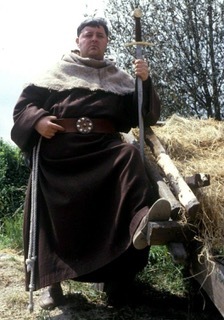
From the bewitching music to the cast of colourful and very memorable characters, Robin of Sherwood captured the hearts of many when it first aired in 1984. Now, 34 years on, I want to take a journey back to this magical time when Robin of Sherwood fever gripped the nation and talk to the actors who made this series so very successful. So please give a warm welcome to Phil Rose, who played the wonderful Friar Tuck.
Hi Phil, it is such an honour to have you on Myth’s, Legends, Books & Coffee Pots today. I hope you don’t mind taking a journey back to Sherwood as I know my readers will be dying to hear, from your lips, what it was like to be a part of something that is considered by many to be a television national treasure. So, let’s crack on…!
How did the role of Friar Tuck first come to your attention?
In 1982, the year before Robin of Sherwood started. Esta Charkham casting director, cast me in a film with Peter Ustinov and Simon Dutton called ‘Memed My Hawk’. Esta knew my profile, size and age and thought I fitted perfectly for Friar Tuck. I was the oldest of the Merries, so my age benefited an advisory monk role which matched the rest of the cast perfectly.
My agent got a call from Esta Charkham to attend the casting for the role of Friar Tuck which had been pitched to me as a one off drama for television. How wrong this turned out to be.
On arriving at Pinewood Studios I was directed to a small waiting room in which another gentleman was waiting. This person informed me they had all gone to lunch and as we waited we got into a lively conversation about all and nothing and after about fifty minutes we were interrupted by a tall, bearded man who entered the waiting room. “Hello Phil, nice to see you, I am Paul Knight the producer”, he said, “I see you have already met our Writer, Richard Carpenter!”
The unknown man I had been talking to, said with a beam on his face “Hello Phil, would you like to play Friar Tuck?”. I was astounded, our chat had more or less been my interview and the rest they say is history!
Such an amazing story of how you got the part of Friar Tuck! Did you do any background research into Friar Tuck before you auditioned for the part?
Before we actually started filming, I did do some research on Friar Tuck but being more of a ‘theatre actor’ – playing the friar in Pantomime, medieval plays and of course ‘Romeo and Juliet’ I was very familiar with the role. When I knew I had the part I did take extra care to watch old Robin Hood films and television series. They were really all a ‘template’ for the character of ‘Friar Tuck’ I ended up playing. Which I truly loved.
What did you think of the script when you first saw it? In particular, what did you think of the religious themes that run alongside the story of Robin and his band of outlaws?
Anyone who knows Kip’s work, knows they are in for a good watch. They realise how much of a great writer he is with past successes like Catweazle e.t.c., but few I feel knew what a great moment in television we were actually about to embark on. Kip was insistent on quality of content and accuracy and had immersed himself in research and the glorious bonus of him being a professional actor himself, meant that he understood both acting, production and historical accuracy.
All of the actors knew they could discuss their scrips and he was extremely encouraging if you thought it was good to ‘play something this way’, rather than what was in the script, or if you wanted to ‘add’ something. He allowed us to be very fluid in our character role and was exceedingly supportive. This allowed the cast to be comfortable in their roles and helped the team jell into what become a very happy and professional cast.
For me in particularly, the religious theme which ran through the series, the holy orders, Godliness of the church and state combined, the ethics of morality, the pagan villagers, and outlaws all kept it fascinating and enjoyable for to discover this particular Tuck inside of me which I do hope people liked.
How much influence did you have on how Tuck was portrayed?
Quite a bit of my influence came from Kip himself, and my theatre background but the other characters bounced ideas between themselves all honing their art and helping others along the way. We had those with few words and we had those with lots and lots of words but all where equal when we worked together. It was the scenes where Tuck was persuaded to join the Outlaws by the actions of Abbot Hugo, and Simon De Belleme that rounded Tucks character off from a monk of completely Godly behaviour to one who flew by his pants with outlaws.
Which leads us on very nicely to the next question. At the beginning of the series, Tuck is The Sheriff of Nottingham's chaplain, but he finds it very easy to abandon that role and live as an outlaw in the woods. Why do you think this is?
As I just mentioned, I played Tuck to have a few questions in his mind when he left the Sheriff to join the outlaws. He did not really see it from going from 'God to Bad', but his moral ethics kicked in and it was more about going from ‘Greed to Good’. He ‘got down with the kids’, the people outside of the world of the monied law lords, he preferred the villagers and the outlaws and their ethics where much ‘closer to god’ than the greedy Sheriff and his cronies.
Tuck comes across as very non-judgmental, especially in Lord of the Trees, when the villagers of Wickham are celebrating The Time of the Blessing. As a Christian monk and a character who, despite his outlaw ways, is very devoted to God, what do you think makes Tuck so tolerant of this pagan celebration?
This is an interesting questions that pops up all the time, mainly by modern day Pagans at Pagan events where I may be doing a talk. 'How can Tuck as a Christian monk, take part or even worse support the villagers in their pagan ritual in ’Lord of the Trees?’
I’m a little like Tuck, I have the Pagan on one shoulder and Christianity on the other. I was like most of us, raised as Christian but find myself very comfortable with modern day Paganism, in particular Herne the Hunter which of course was a major character in Robin of Sherwood.
 Phil speaking at Pagan Pride Under the Greenwood Tree - Nottingham.
Phil speaking at Pagan Pride Under the Greenwood Tree - Nottingham.Conversations with my pagan friend Carole and others at these events, brought to light the impact that Robin of Sherwood had on people discovering an earth based religion in the mid 1980’s and numbers in Paganism shot up, thanks to Kip and his Robin of Sherwood. A lot of people felt as though they had “come home” which is the term often used and I do feel that Robin of Sherwood, connected both on a spiritual level and a mental level with those seeking an earth path.
However in the show, Tuck stands by, watching the pagan themes, understanding that, whilst he can preach the word of God, there is little he can do about the gentleness of the old Pagan culture the villagers have which is ingrained in their psyche. He knows they adhere to Christianity, but deep inside the pagan still hangs on to culture, folklore, ceremony and superstitions. He knows on Sundays they will be in Church but, on May Day, the old Beltane MayPole will be erected and ribbons hanging from it.. and being in touch with the people, and still wanting to be their Christian guide, he takes it all in his stride.
In the most pagan of the series, the ‘Lord of the Tree’s episode, he really touches nature and incidentally nearly got a girlfriend in the process.
Talking of which, the lady who played his ‘would-be' girlfriend trying to seduce him with the apple, was played by a lady called Jill James. Upon writing this interview, It came to my attention that Jill James passed away on the 7th March this year 2019.
God Bless you Jill, a lovely warm and happy lady.
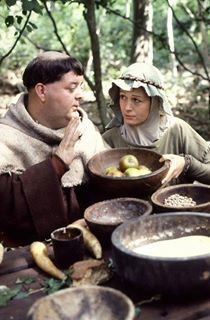 Phil Rose and Jill James.
Phil Rose and Jill James.My sincere condolence to Jill and her family. She made a fabulous ‘would-be’ girlfriend for Tuck.
There is a real sense of Good vs Evil in Robin of Sherwood, and there were some very memorable villains. Who was your favourite villain and why?
I think all the ‘baddies’ left their mark on the series, but good and bad was very complex in the series, you liked them but you hated them, the antipathy of loathing and loving at the same time, However for me ‘Morgwyn of Ravenscar’ was evil to excess. Having a woman baddie sometimes does concentrate the evilness and story lines. I can hear all the lady fans shouting at the screen and agreeing with me. I hope.
I was terrified of Morgwyn of Ravenscar when I was a child!
Robin’s band of outlaws are very much a bunch of misfits. Tuck is a very gentle and compassionate character compared to say Scarlett, and the only thing that seemingly keeps them all together is their devotion to Robin. In Herne’s Son, Tuck is the only outlaw left in Sherwood Forest. Why do you think he chose to remain when everyone else left?
As the band of merry men were a bunch of misfits – but all came together in a very cohesive group of people, with all their own different skills which contributed to a lean, keen, killing machine and good family entertainment – I hope!
By the way, we find Tuck on his own, back in the forest in ‘Herne’s Son’. I think he stayed ‘local’ in the forest, as he had nowhere else to go. He did turn his back on the world thinking Robin was dead. He was a sole renegade living a quiet life, or was he waiting for Robert of Huntingdon, who eventually did turn up and the adventure started all over again. Strangely though I did once have a lengthy chat with Kip about Tuck’s back story – which was very military and very bloody – but that is a story for another day.
Now I want to know more about Tuck’s back story! What was it like working with the great Richard Carpenter?
Working with Kip’s scripts were great. Kip was truly an awesome guy who gave a lot of us a help up in life and we all owe him a lot of respect, we wouldn’t be talking about this now had it not been for him, let alone moved to other successes.
He is sadly missed but his legacy of Robin of Sherwood and other drama series he wrote lives on. He had a lot of faith in all of us to take the script, make it breath and bring it to life. He listened, he delivered. I think all concerned on Robin of Sherwood lost a little something in our lives when he passed. Somethings may be forgotten – but not the Governor! Bless.
 Phil with Tom Carpenter, Richard Carpenter’s son, early this year.
Phil with Tom Carpenter, Richard Carpenter’s son, early this year.Kip truly was wonderful. I am a great admirer of his writing. What was your most memorable scene while filming?
My most memorable scene was myself and Dorothy Tutin who played ‘Lady Margaret of Gisburne’ – Guy of Gisburne’s mum.
Sadly both Dorothy and Robert Addie who played Guy of Gisburne are no longer with us and both are missed.
The episode was ‘The Cross of Saint Ciricus’ in which Dorothy and I were in a very small set. It was the interior of the back of a covered wagon. A very tight space with us, the camera man, the lighting man, the sound man and the director.
This is when she confesses to me that Guy and Robert are ‘step brothers’!! If you watch the scene it is very long in dialogue especially for Dorothy but she did it all in ‘one take’. Very professional and a lovely lady to talk too. Kip has mentioned this at a number of conventions before – How he got the idea for ‘step brothers’. Apparently he was at a crew and cast party for ‘Robin of Sherwood’ and the only two people in the room with light hair was Jason Connery and Robert Addie. Fab!!
Such a fabulous story! What was your favourite line that your character said?
There were some good memorable dialogue moments. Initially, I hated saying ‘Little Flower’! I did mention this to Kip who did listen and take it in. He said to me "Phil, stick with it, it works!". I stuck with it and it worked.
Also the Latin phrases I had to say ( Not having had any previous lessons in Latin.) may all sound a bit dodgy but once again Kip said "Phil say it strong and with conviction". He of course was right. It worked. I hope!
Did Robin of Sherwood change your life in any way?
Having been more of a ’theatre actor’ of course it changed my life. It was an instant recognition from the public and from fans. Suddenly we were all in peoples living rooms, people I had never met and would not have met had it not been from the series.
I enjoyed my fifteen minutes of fame (laugh) but in reality, I’m still getting people stopping me in the street asking for photos and signing things, and “Aren’t you Friar Tuck”, well, yes I am but the name’s Phil, pleased to meet you. I still do some acting and theatre of course but, you couldn’t believe how this series got to the hearts of people like nothing else I have done.
I have a secret love to be honest of fans doing this, I am I feel approachable, and it’s nice that some 35 years on, adults are now introducing their children to the series and still loving it. It must have been good they are rerunning it on different channels.
It was a ‘brilliant boys adventure’, running around with bows and arrows, riding horses, trying to drown Jason in the river in the ‘Herne’s Son” episode (glad you survived Jason!)
It was nice that at the age of 67, I got the chance to run round the forest again and continue on that boys adventure when I was approached by Simon Barnard of Bafflegab Productions, who also produced the audios series “The Scaryfiers” in which I play a very gruff, no nonsense Yorkshire man called Bunny Cheesewright. Simon sent me a script which Bafflegab wanted to produce, which turned out to eventually become “The Knights of Apocalypse” "KOTA", when Simon stepped down from production, Spiteful Puppet and Barnaby Eaton Jones and Ian Meadows, came forward to finish it off. Spiteful Puppet, got the whole original cast together to do a full cast recording. It was a lot of fun to do, of which I am extremely glad they did. So, the ‘ boy’s adventure’ carries on and it’s all in the recording studio – thank heavens for Barnaby Eaton Jones and Spiteful Puppet! It is extremely popular with fans – so the legend goes on. Barnaby then continued the Robin of Sherwood Audios and I read a story for them and again came together on another script.Thank you to all concerned for getting it together.
Do you still keep in touch with any of the cast?
Yes, I do see some of the cast and crew at conventions, the last one being in 2018, where I spent a lot of time getting to know some of the fans and sadly we have met at some funerals. I was rather sad to miss the 60th birthday party for Clive two years ago but I had family business. Maybe your 70th Clive?
 Phil Rose and Jeremy Bullock.
Phil Rose and Jeremy Bullock.Thirty-Four years on and Robin of Sherwood is still enjoyed by so many people. What kind of legacy do you hope Robin of Sherwood will leave for future generations?
After all these years I don’t think our ‘Robin of Sherwood’ has lost anything. We know that it looks a little dated with the mullets and big hair, but you can’t change it. It remains loved because of what it is, what it stands for and how it looked so, aside from the fact it was made in the 1980’s it’s still good today and you cannot improve on that. If it’s good enough for television companies to buy the rights to show it you can’t really argue with that can you?
Other Robins have come and gone but they are for ‘their time’. For future generations we may even see Robin Hood in space – who knows! The very constant thing about our ‘Robin of Sherwood’ is that the most important people, you the fans, who were there at the beginning are here now and will be there with us in the future, and now they bring their children – our future viewing and listening audience.
I do think Kip’s baby is in very good hands for the future in our fans. Bless you all little flowers!
 Phil, at the Horror Fest book launch at Atlantis, famous for great occultists like Aleister Crowley.
Phil, at the Horror Fest book launch at Atlantis, famous for great occultists like Aleister Crowley.Thank you so much for taking time out of your day to talk to us today! It is much appreciated.
You are welcome!
Phil loves to hear from fans of the show, you can find him on Facebook and Twitter.
Published on June 10, 2019 09:44
June 9, 2019
Join #HistoricalFiction author, Linnea Tanner, as she takes a look at Celtic Mythology and Religious Beliefs which are depicted in her fabulous book — Dagger’s Destiny #Celtic #Mythology @linneatanner
Celtic Mythology and Religious Beliefs Depicted in Dagger’s Destiny By Linnea Tanner
The fantastical elements in Dagger’s Destiny (Book 2: Curse of Clansmen and Kings) are based on mystical powers of heroes and heroines from the Celtic legends of Ireland and Wales. One of the Celtic beliefs used in the book to explain how some of the magic works—prophecy, shape-shifting, changing the future—is the soul can reincarnate into other living entities. This concept is consistent with the philosophy of the Greek philosopher, Pythagoras, who believed the soul can reincarnate into other living entities after death.
Another Celtic tradition that was used in the book is the symbolic joining of the goddess of the land with a mortal king in a fertility rite that confers sovereignty to him. If times turn bad during the reign of a king, Celts could ritually sacrifice him to appease the goddess of his territory.
Below is further discussion of these beliefs and the mythology of the sovereignty goddess.
The Fate of the Soul— Transmigration
Diodorus Siculus, a 1st Century Greek historian, wrote: "The Druids studied the nature of moral philosophy, asserting the human soul is indestructible, and also the universe, but that some time or other, fire and water will prevail.”
Julius Caesar remarked that the belief in the immortal soul accounted for the Celts’ bravery in battle.
 Dying Gaul.
Dying Gaul.The Druids taught souls move between this world and the world of the dead—the Otherworld. Death in the physical world results in a soul moving to the Otherworld, whereas death in the Otherworld brings a soul back to this world. Flavius Philostratus (170-249 AD) observed that Celts celebrated birth with mourning for a death in the Otherworld while they regarded death with joy for the birth in the Otherworld.
The Celtic philosophy is similar to that of the 6th Century BC Greek philosopher, Pythagoras, who believed in the soul's reincarnation or transmigration. The soul, by its actions, determines how it will be reincarnated—in human, animal, or even plant form. A similar philosophy was widely accepted in India where it was believed that due to its karma a soul transmigrates from one life to another in a never-ending cycle which could be broken in Nirvana—a state of supreme bliss which, once achieved, liberates the soul from the repeating circle of death and rebirth.
Interestingly, there has been a lot of debate whether Pythagoras adopted his philosophy from the Celts, or did he influence them? Most likely, the concept of immortal souls evolved in parallel. Not only did the Celts believe the soul is reborn into human bodies from one world to the other, but their literature reveals that souls could migrate through various births from one form to another. In Irish texts, Fintan survives the Deluge by changing into a salmon while, in the Welsh texts, Gwion-Bach reincarnates as a hare, fish, bird, and a grain, which is then swallowed by a chicken before he is eventually reborn as Taliesin.
Death and rebirth is a consistent theme throughout Celtic mythological sagas and tales. The warrior's resurrection can be found in the story of the battle between the Tuatha Dé Danaan and the Fomorii in which bodies cast into magic cauldrons return to life. There is a scene of a god accompanying a group of warriors as he drips one of them in a drinking vessel on the Gundestrup Cauldron. The rest are symbolically carrying a tree – perhaps the crann na beatha or tree of life.
 Gundestrup Cauldron Depicting Reincarnation.
Gundestrup Cauldron Depicting Reincarnation.Sovereignty Goddess
The inaugural rite of the king described in Dagger’s Destiny is based on Celtic mythology and traditions. The term sovereignty goddess denotes a goddess of the land confers kingship to a mortal man by marrying or having sex with him. The key element of the sacred marriage is the consummation between the mortal king and the goddess of the territory over which he is to rule. The goddess only enters this marriage if she considers the king suitable. After marriage, she can reject a weak ruler in favor of a man who is better suited.
One of the best-known figures in Irish mythology is the queen-goddess of Connacht, Mebd, from the Ulster cycle. A man becomes king of Connacht only by participating in a ritual drunkenness that opens him up to an ecstatic state to contact with the divine. Mebd is sexually active, mating with nine kings. She allows no man to rule at the royal court unless he has had sex with her.
Ritual Sacrifice of Kings
Another depiction in Dagger’s Destiny is the ritual sacrifice of the king. Based on archaeological evidence, the king was sometimes sacrificed to the goddess of the land when times turned bad during his reign. The king had great power, but he also great responsibility to ensure the prosperity of his people. Through his marriage to the goddess of the land, he is meant to guarantee her benevolence and thus ensure the land is productive. If the weather turns bad, or if there is plague, cattle disease, or losses in war, he is held personally responsible. By using a range of methods to kill the king, the ancient Irish sacrificed him to the goddess in all her forms. This manner of the horrible death is unique to the ritual killing of Celtic kings.
References:
1. Peter Berresford Ellis, The Druids; 1995; William B. Eerdmans Publishing Company, Grand Rapids, MI.2. Stephen Allen, Celtic Warrior 300 BC – AD 100; 2001; Osprey Publishing Ltd, New York.3. John Davies, The Celts: Prehistory to Present Day; 2005; United States: Sterling Publishing Co., New York.4. Julius Caesar, translated by F. P. Long, 2005, The Conquest of Gaul; United States: Barnes & Noble, Inc.5. Joseph Campbell, The Hero with a Thousand Faces—Bollingen Series XVII Third Edition; 2008; Joseph Campbell Foundation; New World Library, Novato.6. Miranda Green, Celtic Goddesses; 1995; British Museum Press, London.
Dagger’s Destiny
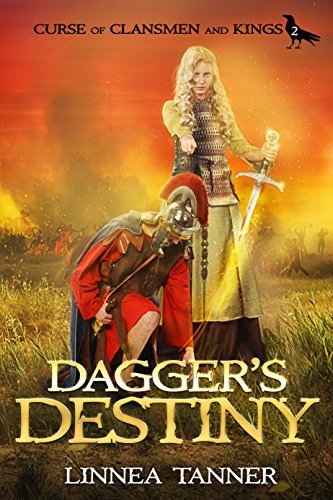
The rich and vibrant tale continues for Catrin and Marcellus that began with the awarding-winning novel, Apollo’s Raven, in the Curse of Clansmen and Kings series. Book 2: Dagger’s Destiny sweeps you into an epic tale of forbidden love, mythological adventure, and political intrigue in Ancient Rome and Britannia.
War looms over 24 AD Britannia where rival tribal rulers fight each other for power and the Romans threaten to invade to settle their political differences. King Amren accuses his daughter, Catrin, of treason for aiding her Roman enemy lover, Marcellus. The ultimate punishment is death unless she can redeem herself and prove her loyalty to her father by forsaking Marcellus and defending their kingdom. Forged into a warrior, she must overcome tribulations and make the right decisions on her quest to break the curse that foretells her banished half-brother and the Roman Empire will destroy their kingdom.
Yet, when Catrin reunites with Marcellus, she is torn between her love to him and duty to King Amren. She must face her greatest challenger who could destroy her life, freedom, and humanity.
Will Catrin finally break the ancient prophecy that looms over her kingdom? Will she abandon her forbidden love for Marcellus to win back her father’s trust and love? Can King Amren balance his brutality to maintain power with the love he feels for his daughter?
Pick up your copy ofDagger’s DestinyAmazon UK • Amazon US • Amazon AU • Amazon CA • Barnes and Noble • Kobo• iTunes• GooglePlay
Linnea Tanner
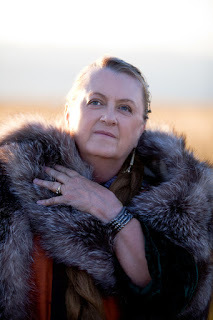 Linnea Tanner weaves Celtic tales of love, magic, adventure, betrayal and intrigue into historical fiction set in Ancient Rome and Britannia. Since childhood, she has passionately read about ancient civilizations and mythology which held women in higher esteem. Of particular interest are the enigmatic Celts who were reputed as fierce warriors and mystical Druids.
Linnea Tanner weaves Celtic tales of love, magic, adventure, betrayal and intrigue into historical fiction set in Ancient Rome and Britannia. Since childhood, she has passionately read about ancient civilizations and mythology which held women in higher esteem. Of particular interest are the enigmatic Celts who were reputed as fierce warriors and mystical Druids.Depending on the time of day and season of the year, you will find her exploring and researching ancient and medieval history, mythology and archaeology to support her writing. As the author of the Curse of Clansmen and Kings series, she has extensively researched and travelled to sites described within each book.
A native of Colorado, Linnea attended the University of Colorado and earned both her bachelor’s and master’s degrees in chemistry. She lives in Windsor with her husband and has two children and six grandchildren.
Connect with Linnea: Website • Blog • Twitter • Facebook • Linkedin • Pinterest • Goodreads.
Published on June 09, 2019 23:00
The Coffee Pot Book Club
The Coffee Pot Book Club (formally Myths, Legends, Books, and Coffee Pots) was founded in 2015. Our goal was to create a platform that would help Historical Fiction, Historical Romance and Historical
The Coffee Pot Book Club (formally Myths, Legends, Books, and Coffee Pots) was founded in 2015. Our goal was to create a platform that would help Historical Fiction, Historical Romance and Historical Fantasy authors promote their books and find that sometimes elusive audience. The Coffee Pot Book Club soon became the place for readers to meet new authors (both traditionally published and independently) and discover their fabulous books.
...more
...more
- Mary Anne Yarde's profile
- 159 followers



